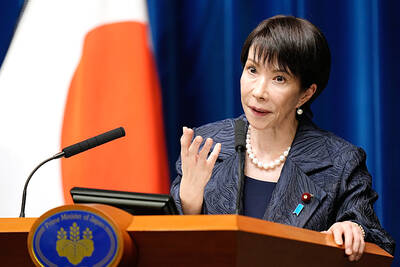Taipei Rapid Transit Corp (TRTC) yesterday acknowledged problems on five Blue Line trains and promised to fix them within one week.
The TRTC found cracks last week on 11 anti-sway devices, which are placed under the cabins to prevent MRT trains from swaying too much. The 11 devices were on five trains, which were immediately sent to Beitou depot for maintenance, TRTC General-Manager Tsai Huei-sheng (蔡輝昇) said at Taipei City Hall.
Tsai dismissed concerns the cracked devices could have affected passenger safety.
The company contacted Siemens, which built the cars, as soon as the damage was detected and replaced the five cars with others so that transportation needs were not affected.
“The anti-sway device is not crucial for MRT trains. It simply helps reduce the swaying and makes passengers more comfortable during the ride,” he said.
The cracks were about 5cm wide, which should not have affected the operation of the trains, Tsai said. He declined to say what caused the cracks, but insisted the damage could be repaired within a week.
Democratic Progressive Party (DPP) Taipei City Councilor Hung Chien-yi (洪健益) said several passengers had complained to him about swaying on the MRT trains. Hung criticized the TRTC for failing to act until it received complaints from passengers.
“The TRTC still doesn’t know what caused the cracks. If not for those passengers, the problematic trains could still be carrying passengers,” he said.
Tsai said travel on the Blue Line would not be affected by the repair work.

The Ministry of Foreign Affairs (MOFA) yesterday voiced dissatisfaction with the Comprehensive and Progressive Agreement for Trans- Pacific Partnership (CPTPP), whose latest meeting, concluded earlier the same day, appeared not to address the country’s application. In a statement, MOFA said the CPTPP commission had "once again failed to fairly process Taiwan’s application," attributing the inaction to the bloc’s "succumbing to political pressure," without elaborating. Taiwan submitted its CPTPP application under the name "Separate Customs Territory of Taiwan, Penghu, Kinmen and Matsu" on Sept. 22, 2021 -- less than a week after China

THE GOOD WORD: More than 100 colleges on both sides of the Pacific will work together to bring students to Taiwan so they can learn Mandarin where it is spoken A total of 102 universities from Taiwan and the US are collaborating in a push to promote Taiwan as the first-choice place to learn Mandarin, with seven Mandarin learning centers stood up in the US to train and support teachers, the Foundation for International Cooperation in Higher Education of Taiwan (FICHET) said. At the annual convention of the American Council on the Teaching of Foreign Languages held over the weekend in New Orleans, Louisiana, a Taiwan Pavilion was jointly run by 17 representative teams from the FICHET, the Overseas Community Affairs Council, the Steering Committee for the Test of Proficiency-Huayu, the

A home-style restaurant opened by a Taiwanese woman in Quezon City in Metro Manila has been featured in the first-ever Michelin Guide honoring exceptional restaurants in the Philippines. The restaurant, Fong Wei Wu (豐味屋), was one of 74 eateries to receive a “Michelin Selected” honor in the guide, while one restaurant received two Michelin stars, eight received one star and 25 were awarded a “Bib Gourmand.” The guide, which was limited to restaurants in Metro Manila and Cebu, was published on Oct. 30. In an interview, Feng Wei Wu’s owner and chef, Linda, said that as a restaurateur in her 60s, receiving an

MORE RETALIATION: China would adopt a long-term pressure strategy to prevent other countries or future prime ministers following in Sanae Takaichi’s steps, an academic said Taiwan should maintain communications with Japan, as Japanese Prime Minister Sanae Takaichi is to lead a revision of security documents, Taiwanese academics said yesterday. Tensions have risen between Japan and China over remarks by Takaichi earlier this month that the use of force against Taiwan would constitute a “survival-threatening situation” for Japan. Prospect Foundation president Lai I-chung (賴怡忠) yesterday said Takaichi’s stance regarding Taiwan is the same as past Japanese prime ministers, but her position is clearer than that of her predecessors Fumio Kishida and Shigeru Ishiba. Although Japan views a “Taiwan contingency” as a “survival-threatening situation,” which would allow its military to